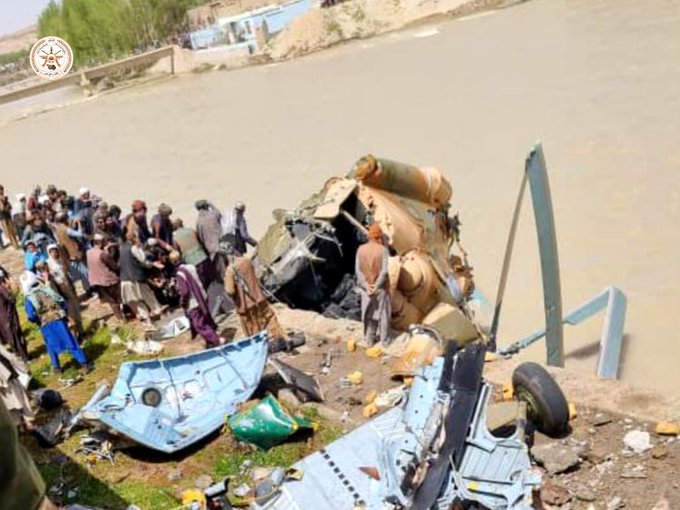A Taliban government delegation is taking part in the St. Petersburg International Economic Forum, after a proposal by Russian ministries to remove the Islamic movement from the list of banned terrorist organizations.
When a delegation of Afghanistan‘s Taliban-led government first visited the St. Petersburg International Economic Forum in 2022, it was the topic of much talk — not just in Russia, but around the world.
Now, two years later, another visit by Afghanistan’s delegation would have barely made the news if it hadn’t been for the proposal by Russia’s foreign and justice ministries to remove the Taliban from the list of banned terrorist organizations.
While Russian President Vladimir Putin has not spoken on the matter directly, he has said the move was necessary to build ties with the Taliban and with the current leadership in Afghanistan.
Hans-Jakob Schindler, a Middle East expert at Counter Extremism Project (CEP), believes Russia’s Foreign Ministry might be expecting something in return for delisting the Taliban as a terrorist group. But that might be easier said than done.
“The Taliban are always very willing to accept advance concessions,” said Schindler, “but things get complicated when it comes to reciprocating them.”
Thomas Ruttig, co-founder of the Afghanistan Analysts Network, interpreted the Kremlin’s recent overtures as “a kind of piecemeal tactic, advancing toward official recognition in very smalls steps — something the Taliban is sure to be pleased about.”
Both Schindler and Ruttig agree the next step following Taliban’s delisting as a terrorist organization could be its official recognition as a legitimate state power.
What next for the Taliban ?
Read this also :- UN Security Council lifts travel restrictions on 4 Taliban leaders
Moscow has kept informal ties with the Taliban since 2015, and Russia is suspected to have delivered weapons to the movement in the past.
In March 2022, both sides assumed official diplomatic relations. Six months prior, in August 2021, Taliban fighters took over Afghanistan’s government in a rapid sweep that was met with little resistance. After 20 years of involvement, Western armed forces and diplomatic representatives who had supported the former government swiftly left the country.
The Taliban were previously in power in Afghanistan between 1996 and 2001. Two decades later, the Taliban’s return has also meant the restoration of their narrow interpretation of Islamic law, and with it, the wide restriction of basic human rights, particularly for women and girls.
No state has officially recognized the Taliban as Afghanistan’s legitimate government, and Russia has listed the movement as a banned organization since 2003.

Kazakhstan was the first country to remove Taliban from its list of terrorist organizations in 2023, and experts believe Russia could follow suit at its ongoing economic forum. But Schindler believes it would be a “diplomatic fumble” to announce such a step without expecting anything in return.
“On the other hand, one cannot sign any trade agreement worth mentioning with an organization that’s officially still listed as a terrorist group,” he said.
The diplomacy expert added that Russia’s steps toward normalizing ties with the Taliban were calculated, and came with limited risks.
“It hardly matters whether Russia crosses the Taliban off its terror list or not, as long as the United Nations Security Council in New York keeps the Taliban on it sanctions list,” he said. The UN’s sanctions list is legally binding for Russia.
To avoid breaching UN sanction agreements, Russia was careful to invite Taliban representatives to St. Petersburg who were not specifically targeted.
Strengthening future relations between Russia and Taliban
According to Russian officials, last year’s trade between both countries saw a fivefold increase and shot past the billion-dollar mark, Schindler said. However, “a billion dollars might be enormous to Afghanistan’s economy, but it’s not much to Russia’s economy,” he added.
Ruttig believes that deepening ties with the Taliban regime is part of a Chinese and Russian foreign policy attempt to fill a geopolitical power vacuum that followed the West’s 2021 withdrawal, and bring the Taliban into an anti-Western alignment.
Schindler added that improved ties could also be driven by economic considerations and the hopes that Afghan soil is rich with strategically relevant minerals, which can only be exploited if peace is brought to the country and the proper infrastructure installed.
Ruttig added that Kabul might not be a priority to Moscow in foreign policy terms, but Moscow was interested in turning Afghanistan into a hub for infrastructure.


Pingback: Taliban And Pakistan Launch Operations Along The Durand Line To Protect Chinese Nationals - DEFENCE AFGHANISTAN